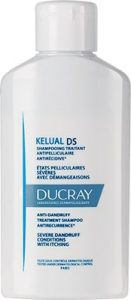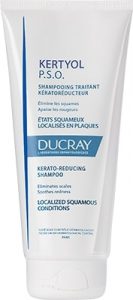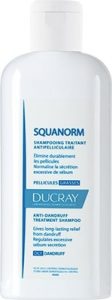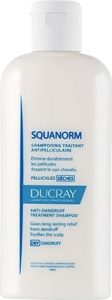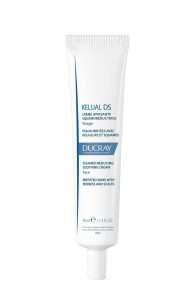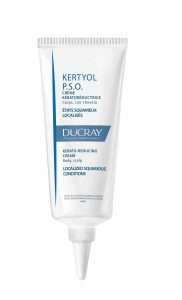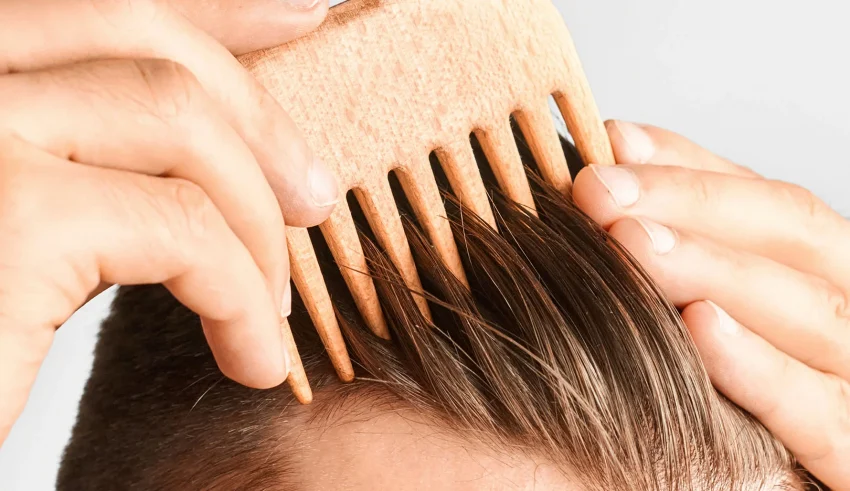
There are a lot of issues to deal with on a daily basis when it comes to your hair. Is it too oily? Too dry? Too bulky? Too curly? Too straight? And then, of course, there’s also dandruff. It’s hard to miss the little white flakes that accumulate on your scalp. But while this condition is extremely common, it can also be difficult to treat. If you are looking for a dandruff treatment, look no further. We spoke with the dermatologist Dr. Roy Moutran to help you find the best ways to treat this problem.
What are the symptoms of dandruff?
The most visible sign of dandruff is the appearance of white, flaky patches on the scalp, made up of dead skin cells that peel off into the hair. According to Dr. Roy Moutran, dandruff can be related to seborrheic dermatitis making the scalp feel itchy.
Other signs include:
- Oily or dry scales on the scalp
- Yellowish to reddish scaly bumps along the hairline (in severe cases)
You may also have dandruff on your eyebrows, chest hair, beard and underarms.
How to know if it’s dandruff or psoriasis?
Dry, flaky skin on your scalp can be uncomfortable. These flakes can be caused by dandruff or psoriasis, which are two very different conditions:
- Dandruff is usually caused by an overreaction of the body to the presence of yeast on the skin. This inflammation leads to an overproduction of skin cells, resulting in the formation of flakes. Dandruff is treated relatively easily and is rarely a serious medical problem.
- Psoriasis, on the other hand, is a problem rooted in your immune system. It is considered an autoimmune disease, which means that special proteins called autoantibodies mistakenly attack healthy tissue. It is a chronic disease for which there is currently no cure and can cause a lot of discomfort.
Dr. Roy Moutran explains that psoriasis is more of a scalp disease. It is characterized by hyperkeratosis; the scales are usually thicker than those of dandruff and you can find psoriasis patches inside the hair.
How to get rid of dandruff once and for all?
Most people with dandruff want instant and permanent relief, but this is not a one-time treatment. Instead, the best course of action is regular care to prevent its recurrence. The good news is that it only takes a few easy steps to incorporate into your existing routine. Keep scrolling for the best dandruff treatment tips.
1- Use anti-fungal ingredients
Once you’ve verified that you do have dandruff, start reading the ingredient labels on shampoos. Common ingredients such as zinc pyrithione, ketoconazole, and selenium disulfide are antifungal and have shown good results in reducing dandruff.
Coal tar and its derivatives are also commonly used to treat dandruff, but be careful when using these ingredients as they can be too harsh. The duration of treatment varies from person to person, but if you don’t see any change after several weeks of use, it’s time to take an appointment from your dermatologist. It’s important to keep in mind that even if you see improvement, you may experience more outbreaks in the future. Some people may need ongoing treatment.
We’ve rounded up the four best dandruff shampoos that will drive dandruff away.
For dandruff caused by seborrheic dermatitis:
Kelual DS Anti-Dandruff Treatment Shampoo
For dandruff caused by psoriasis:
Kertyol P.S.O Keratoreducing Shampoo
For oily dandruff:
Squanorm Anti-Dandruff Treatment Shampoo – Oily Dandruff
For dry dandruff:
Squanorm Anti-Dandruff Treatment Shampoo – Dry Dandruff:
2- Wash your hair often
Although your hygiene habits have no influence on whether or not you get dandruff, don’t be afraid of washing your hair. People often think that washing or drying their hair too much will cause dandruff, but this is a myth. We recommend washing your hair regularly, especially if you use styling products, leave-in conditioners, or dry shampoos.
Now, how often should you wash your hair? “Well, that depends on the medicated shampoo,” explains Dr. Roy Moutran. He adds that if the shampoo is harsh, you should wash your hair twice a week. If you go for a mild shampoo, meaning that the acid concentration is not too high, you can wash your hair several times a week, even daily.
3- Make time for dandruff treatments
We recommend you go for products specifically formulated to take care of flaky skin, especially on the face (eyebrows, nose, eyelids) and on the edge of the scalp.
Here are two effective treatments that destroy flakes and soothe itching as quickly as possible.
For dandruff caused by seborrheic dermatitis:
Kelual DS Squamo-reducing Soothing Cream
For dandruff caused by psoriasis:
Kertyol P.S.O Concentrate
4- Brush your hair
It’s important to take the time to brush your hair too. It’s old school, but it works for getting rid of the scale. Brushing stimulates the scalp and improves blood circulation while gently exfoliating accumulated cells.
5- Consider a prescription
In some cases, dandruff can be severe and persistent enough to warrant a prescription. If nothing over the counter seems to work for you, you’ll want to visit a doctor’s office anyway. Some patients with long-lasting dandruff use medication once a week to lower sebum levels, alternating with regular use of anti-dandruff shampoo. Dr. Roy Moutran explains that isotretinoin is sometimes given to reduce the oiliness of the hair. This leads to a decrease in seborrheic dermatitis and flaking.
Your dermatologist may also choose to prescribe steroids, which are usually used on a short-term basis. These should take effect within a week and your scalp should be back to its pre-flake state in no time.
How to treat dandruff during pregnancy?
Dr. Roy Moutran notes that dandruff treatment during pregnancy is a normal course of treatment. It includes a combination of shampoos containing antifungal ingredients or salicylic acid or topical steroids to reduce itching and flaking.
Here are some helpful tips to keep your pregnancy dandruff-free:
- Manage your stress: Pregnancy is a difficult time that can lead to stress. Your skin condition can be the result of various forms of stress. It is therefore essential to manage it to avoid dandruff during this period.
- Manage your diet: It is absolutely necessary to include vitamin B and zinc in your diet, as they help regenerate the skin cells, strengthen the immune system and maintain the body’s metabolic activity.
- Take care of your hair: Let the dandruff shampoo soak into your hair before washing it with water. Make sure to dry your hair after washing, as the humidity can also lead to other forms of skin irritation.
Last Updated on April 7, 2024

